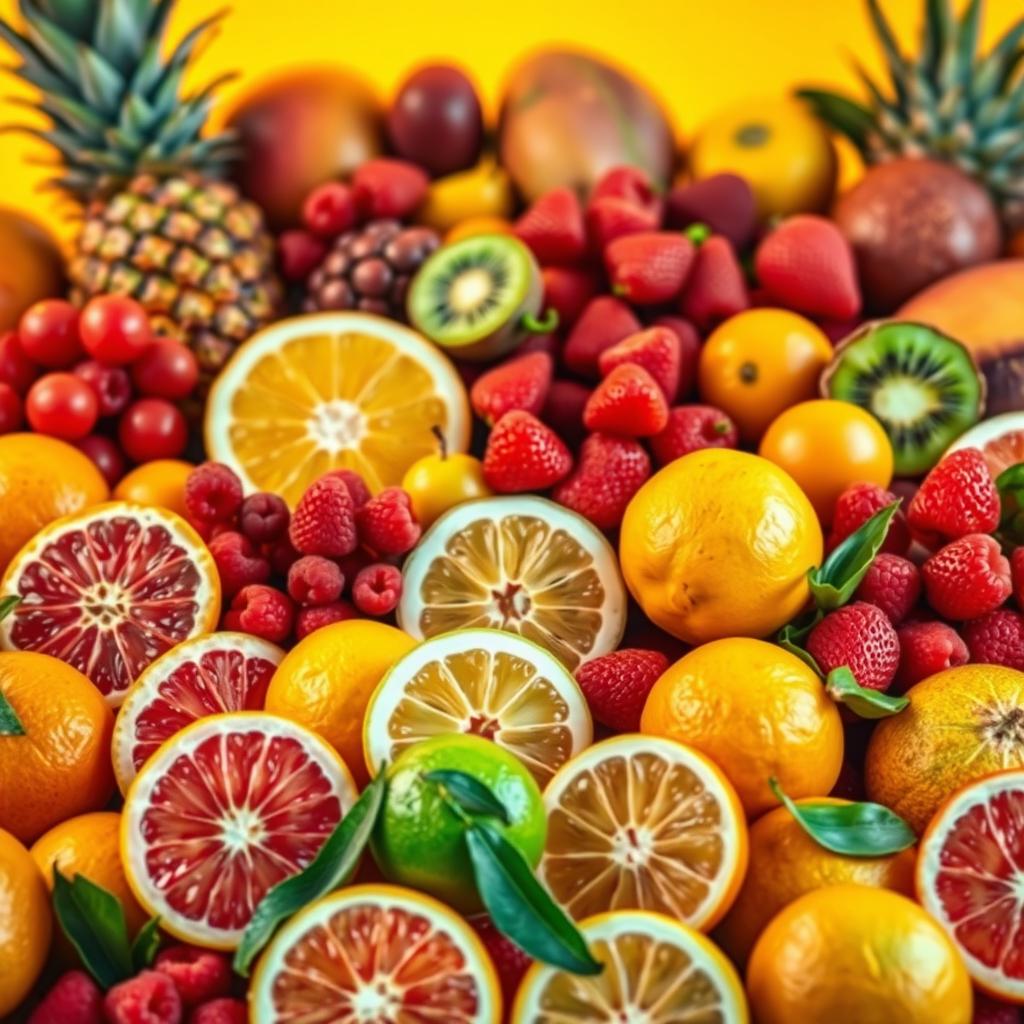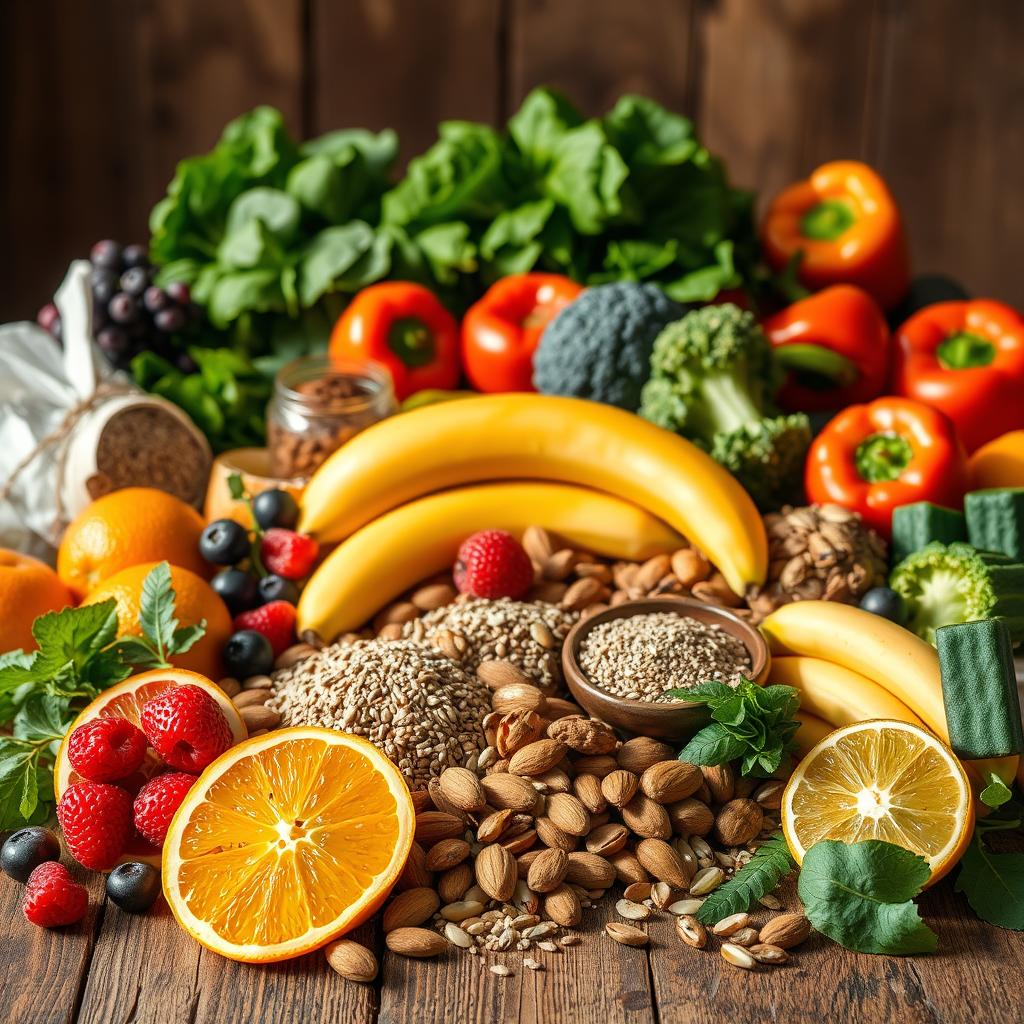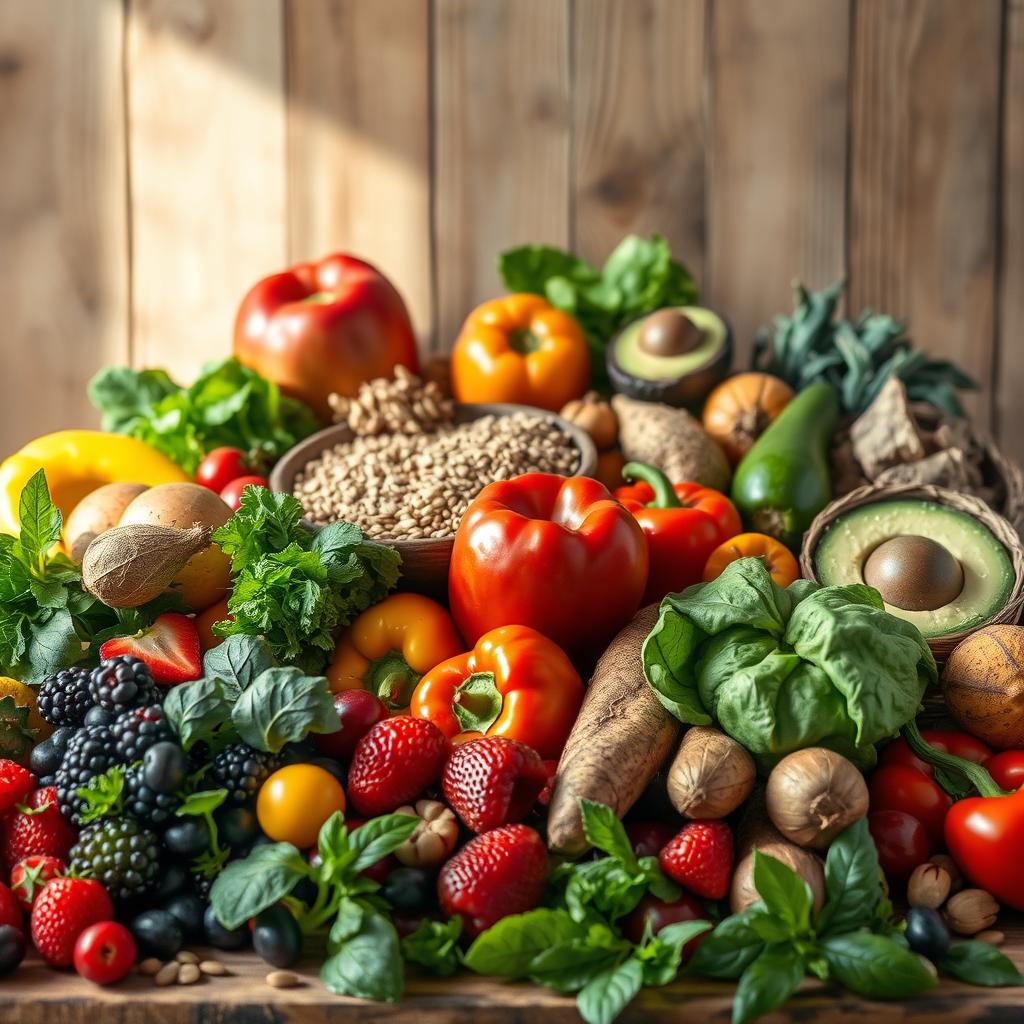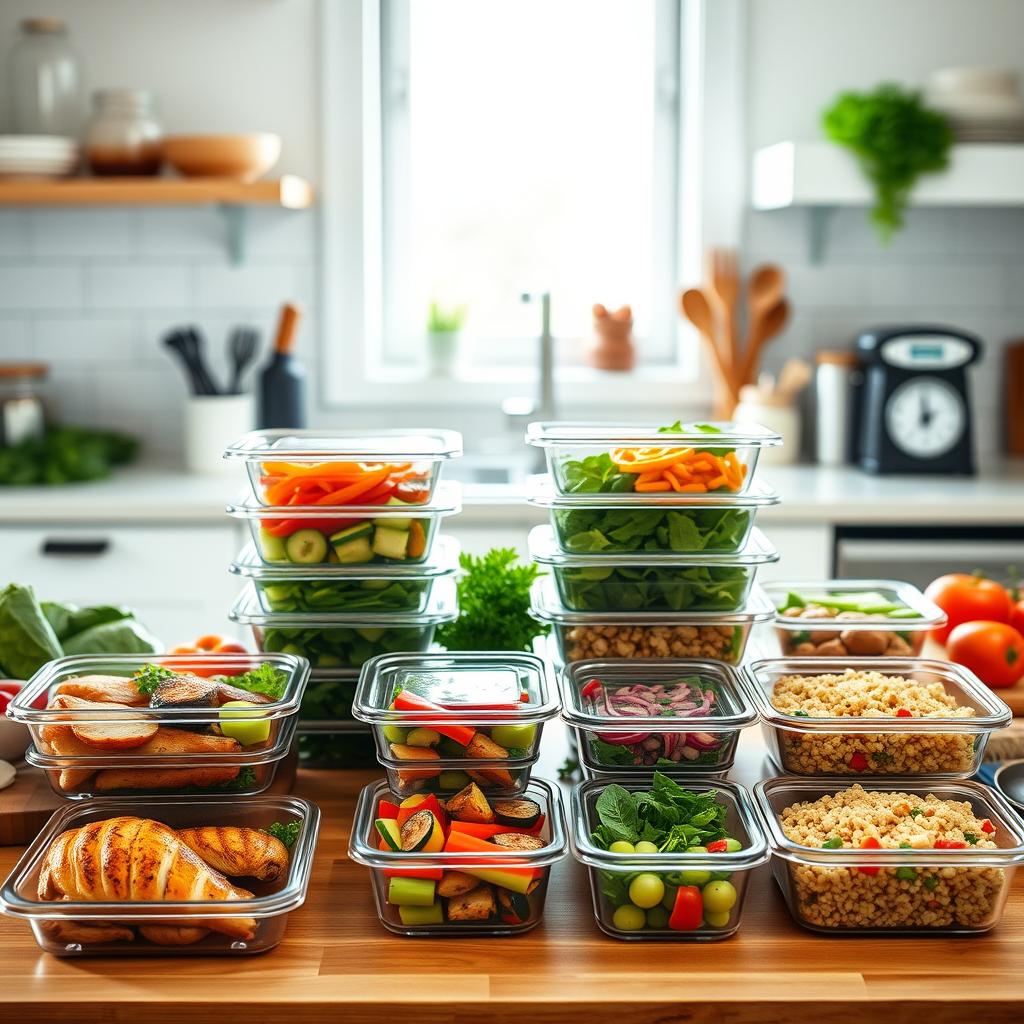We’ve all been there – that mid-afternoon slump when our energy crashes and our focus goes out the window!
But what if the solution to fighting fatigue is simpler than we think? The truth is, the foods we eat directly impact our energy levels and cognitive function, acting as the fuel that powers both our body and brain throughout the day.
Being mindful of what’s on your plate can help you maintain high energy levels and support overall health. By incorporating the right foods into your diet, you can say goodbye to the mid-day slump and hello to sustained vitality.
Key Takeaways
- Certain foods can help boost energy levels and improve focus.
- A balanced diet that includes key vitamins and minerals is crucial for sustained energy.
- Incorporating nutrient-dense foods can help optimize physical energy and mental clarity.
- A healthy diet can help combat fatigue and support overall health.
- Eating the right foods can have a significant impact on both body and brain function.
The Science Behind Food, Energy, and Focus
The intricate relationship between food, energy, and focus is rooted in the complex workings of our brains. Our energy levels are intricately linked to the delicate dance of neurotransmitters in our brains, which influence everything from energy levels and alertness to motivation and happiness.
How Your Body Converts Food to Energy
Our bodies convert food into energy through a complex process that involves the breakdown of nutrients. The brain consumes approximately 20% of the body’s energy despite making up only 2% of its total weight, making proper nutrition essential for optimal cognitive function and performance.
The Brain-Food Connection
The brain-food connection is crucial for maintaining energy and focus. Key players in this connection include serotonin, magnesium, omega-3 fatty acids, and antioxidants. These nutrients help regulate mood, focus, and motivation, while also maintaining the structure and function of brain cell membranes.
For instance, omega-3 fatty acids are essential for brain health, and antioxidants protect brain cells from oxidative stress. Moreover, the brain-gut connection plays a significant role in energy and focus, with the digestive system communicating directly with the brain through the vagus nerve.
What to Eat for More Energy and Better Focus
The key to unlocking more energy and better focus lies in your diet – so, what are the best foods to include? When it comes to energy and focus, nutrition plays a vital role. The right foods can help boost your energy levels and enhance your mental clarity.
Macronutrients: The Foundation of Energy
Macronutrients are the body’s primary source of energy. They include carbohydrates, proteins, and fats. Carbohydrates are broken down into glucose, which is then used by cells for energy. Proteins are essential for repairing and building tissues, including muscles, which are vital for sustained energy. Fats, particularly healthy fats, are crucial for brain function and the absorption of essential vitamins.
Micronutrients: The Energy Catalysts
While macronutrients provide the raw fuel, micronutrients act as catalysts that enable the body to efficiently convert that fuel into usable energy. Vitamins and minerals are crucial for various bodily functions, including energy production. For instance, B vitamins are essential for converting carbohydrates into glucose, while iron is vital for carrying oxygen to cells throughout the body, supporting energy production and maintaining healthy levels of vitality.
- B vitamins help convert carbohydrates into glucose and break down proteins and fats for energy.
- Iron is crucial for carrying oxygen to cells, preventing fatigue and difficulty concentrating.
- Magnesium activates enzymes involved in energy production and regulates neurotransmitters affecting brain function and mood.
Fruits That Fuel Your Day

When it comes to boosting energy, the right fruits can make all the difference in our daily lives. Incorporating a variety of fruits into our diet can provide the necessary nutrients and energy to keep us going throughout the day.
Bananas: Nature’s Energy Bar
Bananas are a convenient and energy-rich snack. They are rich in easily digestible carbohydrates, making them a great choice for a quick energy boost. Bananas also contain potassium, an essential mineral that helps maintain healthy muscle and nerve function.
Berries: Antioxidant Powerhouses
Berries such as blueberries, strawberries, and raspberries are packed with antioxidants. These fruits help combat oxidative stress, which can lead to fatigue and decreased energy levels. Berries are also rich in vitamins and minerals that support overall health.
Citrus and Other Vitamin C-Rich Fruits
Citrus fruits like oranges, grapefruits, and lemons are not only refreshing but also rich in vitamin C. Vitamin C is crucial for energy production as it helps reduce oxidative stress and supports the production of carnitine, a compound that transports fatty acids into mitochondria to be converted into energy. Other vitamin C-rich fruits include kiwis, papayas, and cantaloupes. These fruits help fight fatigue and keep our bodies energized.
By incorporating these fruits into our diet, we can experience a natural energy boost and support our overall well-being. Whether it’s the convenience of bananas, the antioxidant power of berries, or the vitamin C richness of citrus fruits, there’s a fruit to suit every need and preference.
Vegetables for Sustained Energy
Incorporating the right vegetables into your diet can significantly boost your energy levels and support overall health. Vegetables are packed with essential nutrients, vitamins, and minerals that play a vital role in maintaining energy and supporting brain function.
Leafy Greens: Magnesium and Iron Boosters
Leafy greens such as spinach and kale are rich in magnesium and iron, crucial for energy production. Magnesium helps in the production of ATP (adenosine triphosphate), the energy currency of the body, while iron is vital for transporting oxygen to cells, supporting energy production.
Sweet Potatoes and Beets: Complex Carb Champions
Sweet potatoes and beets are complex carbohydrate sources that provide sustained energy. They are rich in fiber, vitamins, and minerals that help in slow release of glucose, preventing energy crashes. Beets are also rich in nitrates, which help improve blood flow and oxygen delivery to cells.
Cruciferous Vegetables: Brain-Boosting Benefits
Cruciferous vegetables like broccoli, cauliflower, and Brussels sprouts are not only rich in antioxidants but also support brain health. They contain sulforaphane, which activates pathways that increase the body’s production of antioxidant enzymes, protecting brain cells from oxidative stress. These vegetables also support detoxification processes and stabilize blood sugar levels.
| Vegetable | Nutrient | Benefit |
|---|---|---|
| Leafy Greens | Magnesium, Iron | Energy Production |
| Sweet Potatoes | Complex Carbohydrates | Sustained Energy |
| Cruciferous Vegetables | Antioxidants, Sulforaphane | Brain Health, Detoxification |
Protein Sources That Prevent Energy Crashes
When it comes to maintaining energy levels, protein plays a crucial role – let’s explore the best sources! Protein is essential for sustaining energy and preventing crashes throughout the day.
Lean Meats and Fatty Fish
Lean meats like chicken, turkey, and lean beef are excellent sources of protein that help maintain energy levels. Fatty fish such as salmon are not only rich in protein but also in omega-3 fatty acids, which support brain health and can enhance focus and mental clarity.
Plant-Based Proteins: Legumes and Tofu
For those preferring plant-based options, legumes like lentils, chickpeas, and black beans are rich in protein and fiber, providing sustained energy. Tofu is another versatile protein source that can be easily incorporated into meals to boost energy.
Eggs and Dairy: Complete Protein Packages
Eggs and dairy products are complete protein sources, containing all essential amino acids necessary for optimal energy production. Eggs are particularly beneficial, with one large egg providing 6.3g of protein along with vitamins and minerals like phosphorus, potassium, and choline. These nutrients help keep the body energized and feeling full for longer. Dairy products like Greek yogurt offer a perfect balance of protein, carbohydrates, and fat, providing immediate energy while keeping you satisfied.
- Eggs and dairy products provide complete proteins containing all essential amino acids needed for optimal energy production and cognitive function.
- The choline in egg yolks supports the production of acetylcholine, a neurotransmitter crucial for maintaining focus and mental energy.
- Greek yogurt’s combination of protein, carbohydrates, and fat provides sustained energy and satisfaction.
Whole Grains and Complex Carbohydrates
To maintain energy and focus, it’s essential to understand the role of whole grains and complex carbs. We should focus on consuming complex carbohydrates like whole grains, fruits, and vegetables instead of refined products.
Oats: The Breakfast of Champions
Oats are an excellent source of sustained energy, thanks to their high fiber content. Starting your day with oatmeal can help maintain your energy levels throughout the morning. We recommend pairing oats with fruits or nuts for added nutrition.
Quinoa and Brown Rice: Sustained Energy Releasers
Quinoa and brown rice are complex carbohydrates that release glucose gradually, providing sustained energy. These foods are rich in fiber, vitamins, and minerals, making them ideal for maintaining energy levels throughout the day.
Whole Grain Breads and Pastas
Whole grain breads and pastas are superior to their refined counterparts due to their higher content of fiber, vitamins, and minerals. The complex carbs in these products break down slowly, delivering a steady supply of glucose to your brain and muscles. When shopping, look for products that list “whole grain” as the first ingredient and contain at least 3 grams of fiber per serving.
Nuts, Seeds, and Healthy Fats
Nuts, seeds, and healthy fats are not just delicious, they’re also packed with nutrients that support sustained energy!
These foods provide a boost to our diet, offering a mix of fats, nutrients, and calories that are essential for maintaining energy levels throughout the day. Let’s dive into some of the best options!
Omega-3 Rich Options: Walnuts and Flaxseeds
Walnuts and flaxseeds are rich in omega-3 fatty acids, which are crucial for brain function and may help support energy production. Adding these to your diet can be as simple as sprinkling ground flaxseeds on your oatmeal or snacking on a handful of walnuts.
Magnesium Powerhouses: Almonds and Pumpkin Seeds
Almonds and pumpkin seeds are magnesium-rich foods that play a significant role in energy production and muscle function. Magnesium helps regulate energy metabolism and can help alleviate fatigue. Enjoy these as a snack or add them to your meals for an energy boost.
Avocados: The Perfect Energy Fat
Avocados are a unique fruit that provides a combination of healthy fats, fiber, and essential nutrients, making them an ideal food for sustained energy. The healthy fats in avocados slow down digestion, providing a steady release of energy and helping you feel satisfied for hours. With their rich content of monounsaturated fats, fiber, and B vitamins, avocados support stable blood sugar levels and provide the necessary content for optimal energy metabolism.
Hydration and Beverages That Boost Energy
We often focus on what we eat to gain energy, but what we drink is just as important for sustained vitality. The right beverages can help maintain our energy levels throughout the day.
Water: The Foundation of Energy
Water is essential for maintaining energy. Even mild dehydration can cause fatigue, headaches, and difficulty concentrating. Drinking enough water throughout the day is crucial for keeping your body and mind functioning at their best. Staying hydrated helps in maintaining the energy levels.
Tea: Balanced Energy Without the Crash
Tea, especially green tea, is another excellent beverage for energy. It contains a moderate amount of caffeine along with L-theanine, an amino acid that promotes relaxation and focus. This combination provides a balanced energy boost without the jitters or crash that can come with other caffeinated drinks.
When and How to Use Caffeine Effectively
Caffeine can be a useful tool for increasing energy, but timing is everything. Consuming caffeine when cortisol levels are naturally high (typically 8-9 am, 12-1 pm, and 5:30-6:30 pm) can lead to increased tolerance and reduced effectiveness. For sustained energy, consider smaller, more frequent doses of caffeine (50-100mg) rather than one large dose. Pairing caffeine with a small amount of protein and healthy fat can also help slow its absorption and provide more sustained energy.
Conclusion: Creating Your Energy-Boosting Meal Plan
Eating to energize is about making informed choices. We believe that being mindful of what’s on your plate can help fight fatigue and maintain long-lasting energy. To achieve this, focus on regular meal timing, eating every 3-4 hours to maintain stable blood sugar levels.
Build your meal around complex carbohydrates, lean protein, and healthy fats. Pay attention to how different foods affect your personal energy levels. Some people may be more sensitive to certain foods, so keeping a food-energy journal can help.
At the end of the day, optimizing your energy levels involves a balanced diet and regular physical activity, proper hydration, and adequate sleep at the right time. By making these habits a part of your daily routine, you’ll be well on your way to maintaining high energy levels throughout the day with a well-planned diet.


